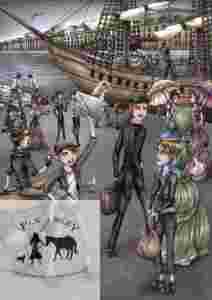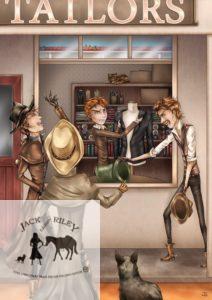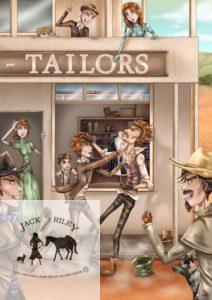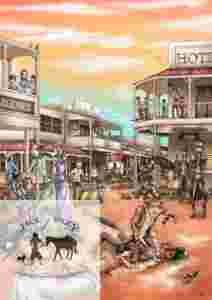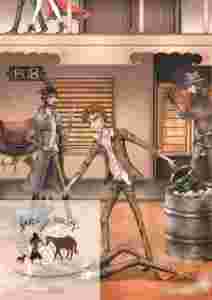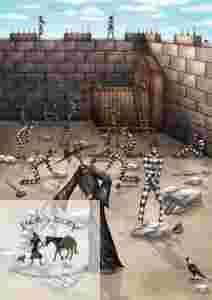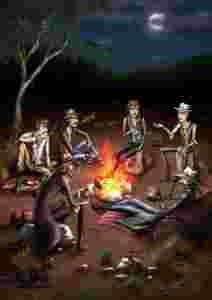The  Times
Times
16 August 1870
FOR SALE
JACK RILEY WINE COOLER BAG
The Jack Riley Edition insulated wine cooler bag celebrates the original Man from Snowy River. Carry 2 bottles of wine, beer, or spirits to a BBQ, dinner, or any special occasion. Order yours now from JackRiley.com. Be the envy of your friends with your waxed cotton wine bottle holder. It also makes a great wine gift pack.
Be quick. Order Yours now from
SHIPPING ADVERTISEMENTS
SAN FRANCISCO and OVERLAND to ENGLAND.
The CALIFORNIAN, New Zealand, and Australian MAIL LINE of STEAM PACKETS, under contract for a Monthly Mail Service, carrying the European and American Mails, and leaving Sydney on the 30th of each month, at 4 P.M. –The splendid English and American steamships. S.S. City of Melbourne, 1,500 tons.
S.S. Wonga Wonga, 1,550 tons.
S.S. John L. Stephen, 2,500 tons.
Time to San Francisco, 31 days.Time from San Francisco to Liverpool, 16 days.
Total about 47 days.
Parties proceeding to the United States, Canada, Great Britain, France, Germany, or any other part of Europe should avail themselves of this route, which is admitted to be a perfect pleasure trip. Two months are allowed for transit by rail through America, the scenery being among the grandest in the world.
Invalids need have no hesitation in taking this route, which is through calm sea and delicate climates. The most excellent comfort can entirely rely on both sea and rail. Experienced surgeons accompany the steamers.
Rates:
To and San New
from Francisco York Liverpool
First
class£40 0 0 £63 0 0 £76 10 0
Second
class £30 0 0 £48 0 0 £56 0 0
Third
class £20 0 0 £33 0 0 £38 0 0
With a reduction of 10 percent for return tickets.
Early application is necessary, as only a limited number of passengers will be taken, to secure comfort.
For further particulars in regard to passages and freights, applyto OSBORN, CUSHING and Co., agents, 44 William Street.
The steamship
ALDINGA,
HUGH MACMEIKAN, Commander, Will sail for Adelaide
On Tuesday, 23 August,
At 1 O’clock,
From Queen’s Wharf,
With passengers and cargo.
Cargo received on board at Queen’s Wharf.
MACMEIKAN, BLACKWOOD and Co., 2 King Street.
Tutors, Governesses, Clerks, etc.,
Number of PERSONS WANTED, as follows, viz. :
Pawnbroker’s Assistant; Youth, butcher’s cart, Man-cook for hotel; Stonebreakers.
Couples-gardener,servant, £100;groom,cook, £80.
Wheelwright, Blacksmith’s Improver, Whitesmith.
Youths, for apprenticeships and otherwise.
Man, for garden and other work.
Cooks and Laundresses, General Servants.
EMPLOYMENT INSTITUTE, opposite Argus office.
AN experienced TRAVELLER for general merchandise, chiefly for the up-country trade, may meet with an ENGAGEMENT.
Apply by letter, enclosing a copy of testimonials, Box 81, Post-office.
A Young lady, recently from England, wishes to meet with music and Hebrew PUPILS. Address 80 Gore Street, Fitzroy.
LAW.-WANTED, SITUATION for a respectable, intelligent lad, 14; write a good hand, knows public offices, &o. G. B., Bremen-cottage, George Street, East Melbourne.
CHINESE LEPERS.
TO THE EDITOR OF THE ARGUS.
Sir,-If you will allow me, I wish to make a suggestion in reference to the above subject, as follows:-In the first place, it is pretty clear that something must be done, and that immediately, to relieve the misery and want of the Chinese lepers. Now, considering that the Chinese are an alien race, who keep themselves aloof from the European population, that they come here to enrich themselves, and that whom they have acquired what they consider sufficient money, they go away again to their own country to spend it.
I think the least they can do is to support their own poor, and as they will not voluntarily do so, why we must make them. I, therefore, propose that a small poll tax should be imposed upon every Chinaman in the country, the proceeds to be devoted towards the maintenance of order and morality amongst themselves, and also for the support and proper care of their sick and helpless.
I am, Sir,your obedient servant,
MEDICUS;
10 August,
WEDNESDAY, 17 AUGUST, 1870.
The elections for the Legislative Council are close at hand. Today the first writs will issue, and in a very short time, the whole colony will be asked to infuse new blood into one of the most important institutions of the state. We trust that we do not under-value the profound political repose that the country now enjoys; yet, without seeking in any way to disturb it, we should like to see somewhat more interest in these elections than they appear likely on the present occasion to elicit.
The Council has of late years arisen, and very justly, in the public estimation. It has shown that it can be firm when firmness is needed and that it can give way in deference to a clear expression of public opinion. It has effectually maintained its own privileges and guarded the most sacred lights of the Constitution. It has accepted a reasonable compromise on a question which has been long disputed, and on which it had repeatedly expressed very decided views, it is to this union of courage and moderation that we owe our present tranquillity that we are not writhing under Mr HIGINBOTHAM’S heel, and that the country is not convulsed with an agitation of which religion was the subject.
With good reason, therefore, we are anxious that the electors should seriously consider the duties that this periodical election involves and that men of property and of intelligence should be willing to take their fair share in the burthens and the honours of public life. Unhappily, the choice of the constituencies is needlessly restricted.
That most unwise property qualification against which we have over and over again fruitlessly protested, although it has been reduced, still operates to exclude from the Council, many men who would be an acquisition to its ranks. It is useless, however, now to lament the continuance of this significant error, and we must be content with such materials as, in the circumstances, we can obtain. We are glad to say that for every one of the constituencies, eligible candidates are before the electors.
We begin, of course, with the Central Province. In this case, our duty is clear, although it is a painful one to discharge. We desire to speak with all kindness and all respect of Captain COLE. He is a fine old gentleman and a very estimable man in private life. But why will he persist in seeking to continue in politics, for which he is entirely unfit 1 He does not comprehend the veriest elements of political knowledge? He cannot speak two consecutive words. He bores the house with reading long extracts which he does not understand and which no one else can hear.
He suffers, too, from physical infirmities which of themselves unfit him for public life. His bestfriends cannot wish that he should live” after his flame lacks oil to be the”snuff of younger men.” It was a sad sight to see the brave old veteran who, in the days of ” the valiant ” Captain BROKE and his noble heart’s ” of oak,” had hunted the Atlantic for French ships, and had served his guns at New Orleans and at Washington, trying to lead a reluctant House as the colleague of Mr G. P. SMITH and Mr VALE.
Honest old Tory that he is, he still clings to the corn laws of his youth, and with all the simplicity, and we will add all the courage, of a sailor, he has fallen in with a set of political crimps and fights for them as loyally as if they were true men. It is a sorry sight, and we hope that we have seen the last of it. Even if there wereno other objections to him, it is not fit that a gentleman who holds extreme protectionist views should represent this great mercantile and industrial community. The electors are therefore fortunate in having before them another candidate of a stamp very different from poor Captain COLE, Mr J. S. JOHNSTON, who has been induced to offer his services to the constituency, is too well known in public life to require any commendation from us. With respect to most of the other provinces, we need to say but little. For the Eastern and the North-Western, Mr HIGHETT and Mr MITCHELL will probably be re-elected without opposition. Mr TUCKER, indeed, the once-famous member for Kyneton, seems to have had
some thoughts about the North-West, but he is, after all, no fool and knows that discretion is the better part of valour.
The services of both the retiring members during the last few eventful years well entitle them to a continuance of their trust. In the South-Western Province, too, it is not likely that there will be a contest. It is only a few months since the retiring member, Mr CUMMING, had a fair stand-up fight with Mr COWAN and won. We believe that Mr COWAN is content to accept his defeat as decisive of the feeling of the constituency and is reluctant to disturb the peace of the province by so speedy a renewal of the conflict.
We do not grudge Mr CUMMING his good fortune. He is, we believe, a very respectable man and promises to make a much better member than his very foolish address when he was first elected led us to expect. In the Western Province, Sir JAMES PALMER will have a worthy successor in Mr M’KELLAE. Mr P. J. MARTIN, who has been on the rampage for Parliament this long time, has indeed announced his intention to contest the seat.
There are few persons more entirely unfit than Mr MARTIN for the position to which he aspires, and we hope that if he should be so misguided as to go to the poll, the electors of the West will give him good cause to repent of MB temerity. For the Southern Province -two candidates have declared themselves-the late members, Mr DEGRAVES and Mr HALFEY. In any circumstances, we should of the two prefer
Mr HALFEY. His views are much more liberal than those of his opponent, and he showed an example of political courage too rare in this country by forfeiting his seat for Sandhurst when he might have retained it if he had consented to sacrifice his convictions upon the Darling Bill. But, apart from these considerations, there are reasons which would at the present time induce us to object to Mr DEGRAVES, even if he were the very best man in the whole Council. It is notorious that Mr DEGRAVES’ affairs have recently been embarrassed.
We do not think that the law intends that a gentleman so circumstanced shall take part in public life, much less that he should sit in a House where the possession of considerable in- dependent means is an essential condition. Nor do we think that such an evasion of the law as the membership of Mr DEGRAVES is calculated to increase the public respect for our legislators, or to raise the Council itself and its favourite qualification in general esteem.
We regret that Mr DEGRAVES himself should not have perceived the indelicacy, to use no harsher word, of his candidature, and of the pernicious example which he must set if he resumes his place in the Council. But we hope that these considerations will not be lost upon the electors and that they will record their emphatic disapprobation of a proceeding which is sure to find but little favour with every honest man in the community. The claims of the Western district to share in the advantages of railway communication were pressed upon the Government on Monday last by an influential deputation that waited upon
the Chief Secretary for that purpose. But the case which the deputies made out, though it seems a solid one when looked at from their point of view, is not quite so complete as they seem to have supposed. What they want is that the state should guarantee a loan of something like £200,000, for the purpose of making a railway northwards from Portland to Hamilton; and one of their arguments is that upwards of £30,000 of public money has already been spent forming and preparing 100 miles of the proposed new line, which will be lost to the country if the project is not gone on with.
They further show that there has been a great deal of agricultural settlement on either side of this line, for the production of which a market must be found in Melbourne, and that a railway connecting Portland with the interior would prove the most economical means of bringing this produce to market, inasmuch as sea-borne traffic is always cheaper than the traffic of any other description.
As a further argument, they cite the extent and resources of the district which a railway ortram road northwards from Hamilton would accommodate, and they hint that some injustice will be done to the electorate in the locality if the state leaves them at the mercy of the execrable roads that now lie between them and the produce markets of the colony.
The case of the Western deputies is a perfect one so far as it goes. If there ever was a reason for commencing the old Grange tramroad, of which only old colonists can remember the history, there is now much more excellent reason to complete it.
During the 14 years that have elapsed since it was projected, the country through which it runs has been peopled, and it is now rich in various products to which ready means of transit would give a market value. Some progress has also been made since then in the science of railway engineering, and under the cheap modes of construction that have recently been adopted, the 16£ miles that have already been formed could be completed (the deputies allege) at the cost of £1,200.
To carry on the line through Greenhills to Branxholme-in all, 38 miles from Portland-would only cost £00,000 or £70,000, while the whole distance to Hamilton, 51 miles, might be accomplished for even less than the £200,000 mentioned above. This sum, our readers will perceive, is quite trifling in comparison with the vast amounts that we have already expended, or now are expending, on railway works in other parts of the colony and does not exceed the annual expenditure on railway construction for which the Land Act provides.
It is also quite true that wool, and wheat, and potatoes could be brought to Melbourne from the country northwards of Portland more cheaply by means of a tramroad to the seaboard, and thence by sea than by rail all the way, and for all these reasons it would probably be a wise course to construct a Portland and Branxholme line, with a view to ultimate extension to Hamilton, if there were no comprehensive scheme of state railways in progress into which such a line could not be made to fit.




